
Midori-AI
Midori AI's Mono Repo! Check out our site below!
Stars: 118
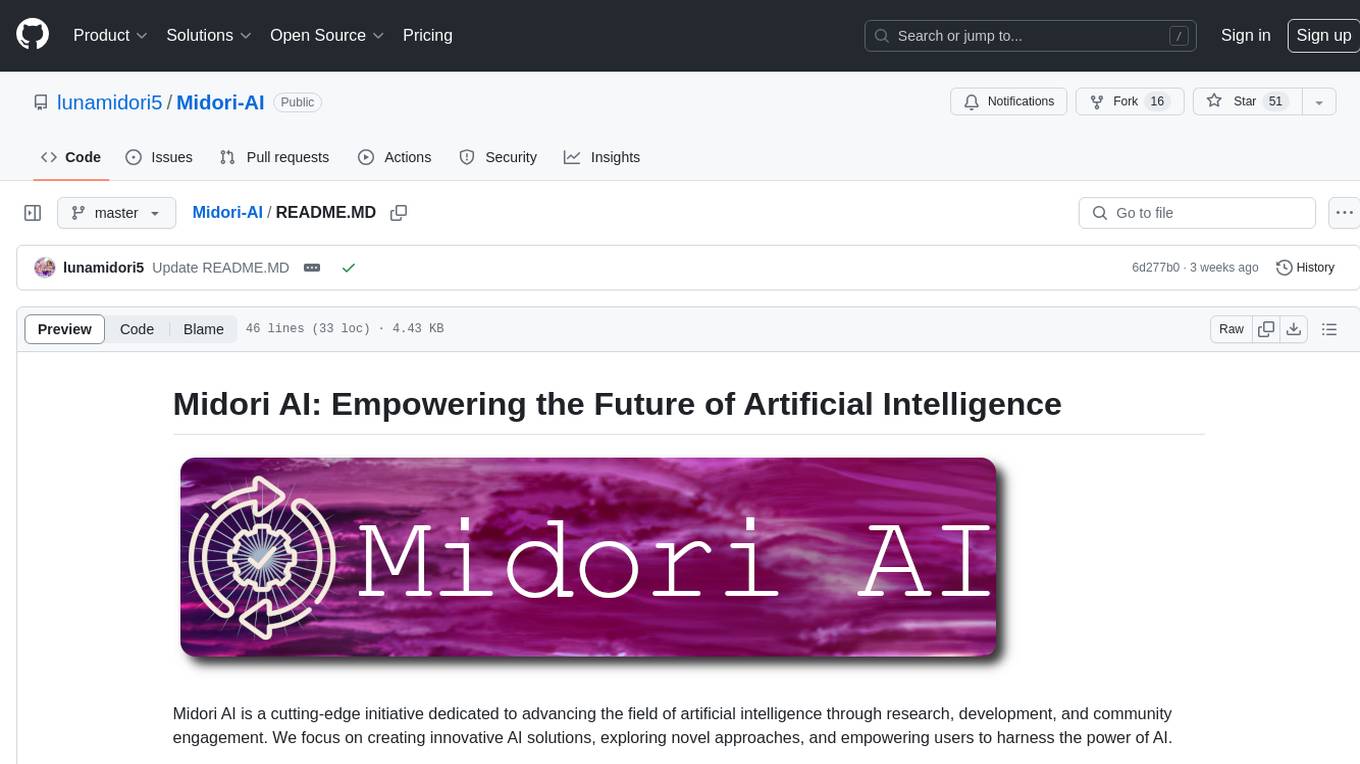
Midori AI is a cutting-edge initiative dedicated to advancing the field of artificial intelligence through research, development, and community engagement. They focus on creating innovative AI solutions, exploring novel approaches, and empowering users to harness the power of AI. Key areas of focus include cluster-based AI, AI setup assistance, AI development for Discord bots, model serving and hosting, novel AI memory architectures, and Carly - a fully simulated human with advanced AI capabilities. They have also developed the Midori AI Subsystem to streamline AI workloads by providing simplified deployment, standardized configurations, isolation for AI systems, and a growing library of backends and tools.
README:
Midori AI is a cutting-edge initiative dedicated to advancing the field of artificial intelligence through research, development, and community engagement. We focus on creating innovative AI solutions, exploring novel approaches, and empowering users to harness the power of AI.
This is our mono repo!
Check out each of our other Git Module Repos!
Main SubModules:
- Website - Link to Module
- Pixelarch - Link to Module
- Obsidian Notes - Link to Module
- Subsystem Manager - Link to Module
Program Based SubModules:
- Discord GPT Bot (with Rag) - Link to Module
- Endless AutoFigher - Link to Module
For more info stop by our site! - https://io.midori-ai.xyz/
- Join our Discord community: https://discord.gg/xdgCx3VyHU
- Connect with us on Facebook: https://www.facebook.com/TWLunagreen
- Follow us on Twitter: https://twitter.com/lunamidori5
- Explore our Pinterest boards: https://www.pinterest.com/luna_midori5/
- Follow us on Twitch: https://www.twitch.tv/luna_midori5
- Subscribe to our YouTube channel: https://www.youtube.com/channel/UCVQo4TxFJEoE5kccScY-xow
- Support us on PayPal: https://paypal.me/midoricookieclub?country.x=US&locale.x=en_US
Unleashing the Future of AI, Together.
For Tasks:
Click tags to check more tools for each tasksFor Jobs:
Alternative AI tools for Midori-AI
Similar Open Source Tools

Midori-AI
Midori AI is a cutting-edge initiative dedicated to advancing the field of artificial intelligence through research, development, and community engagement. They focus on creating innovative AI solutions, exploring novel approaches, and empowering users to harness the power of AI. Key areas of focus include cluster-based AI, AI setup assistance, AI development for Discord bots, model serving and hosting, novel AI memory architectures, and Carly - a fully simulated human with advanced AI capabilities. They have also developed the Midori AI Subsystem to streamline AI workloads by providing simplified deployment, standardized configurations, isolation for AI systems, and a growing library of backends and tools.
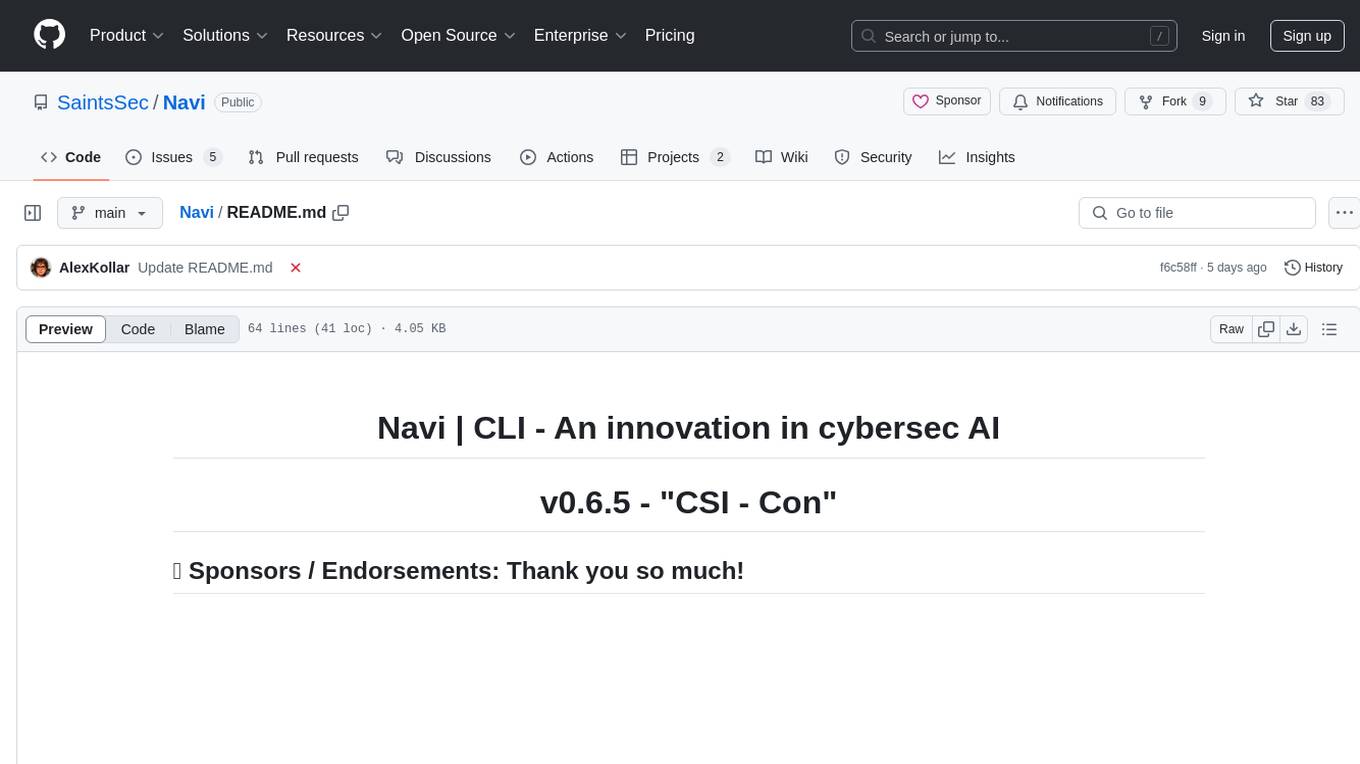
Navi
Navi is a CLI tool that revolutionizes cybersecurity with AI capabilities. It features an upgraded shell for executing system commands seamlessly, custom scripts with alias variables, and a dedicated Nmap chip. The tool is in constant development with plans for a Navi AI model, transparent data handling, and integration with Llama3.2 AI. Navi is open-source, fostering collaborative innovation in AI and cybersecurity domains.
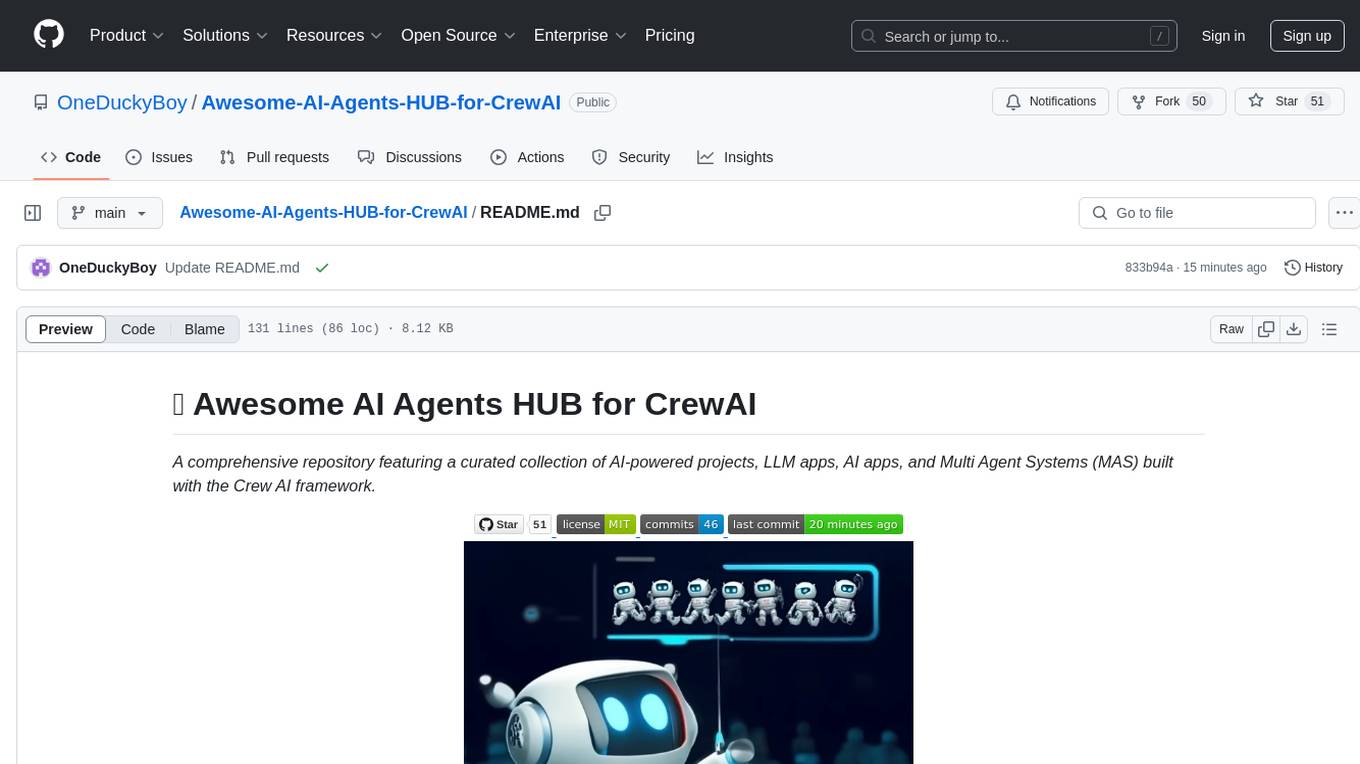
Awesome-AI-Agents-HUB-for-CrewAI
A comprehensive repository featuring a curated collection of AI-powered projects and Multi Agent Systems (MAS) built with the Crew AI framework. It provides innovative AI solutions for various domains, including marketing automation, health planning, legal advice, and more. Users can explore and deploy AI agents, Multi Agent Systems, and advanced machine learning techniques through a diverse selection of projects that leverage state-of-the-art AI technologies like RAG (Retrieval-Augmented Generation). The projects offer practical applications and customizable solutions for integrating AI into existing workflows or new projects.
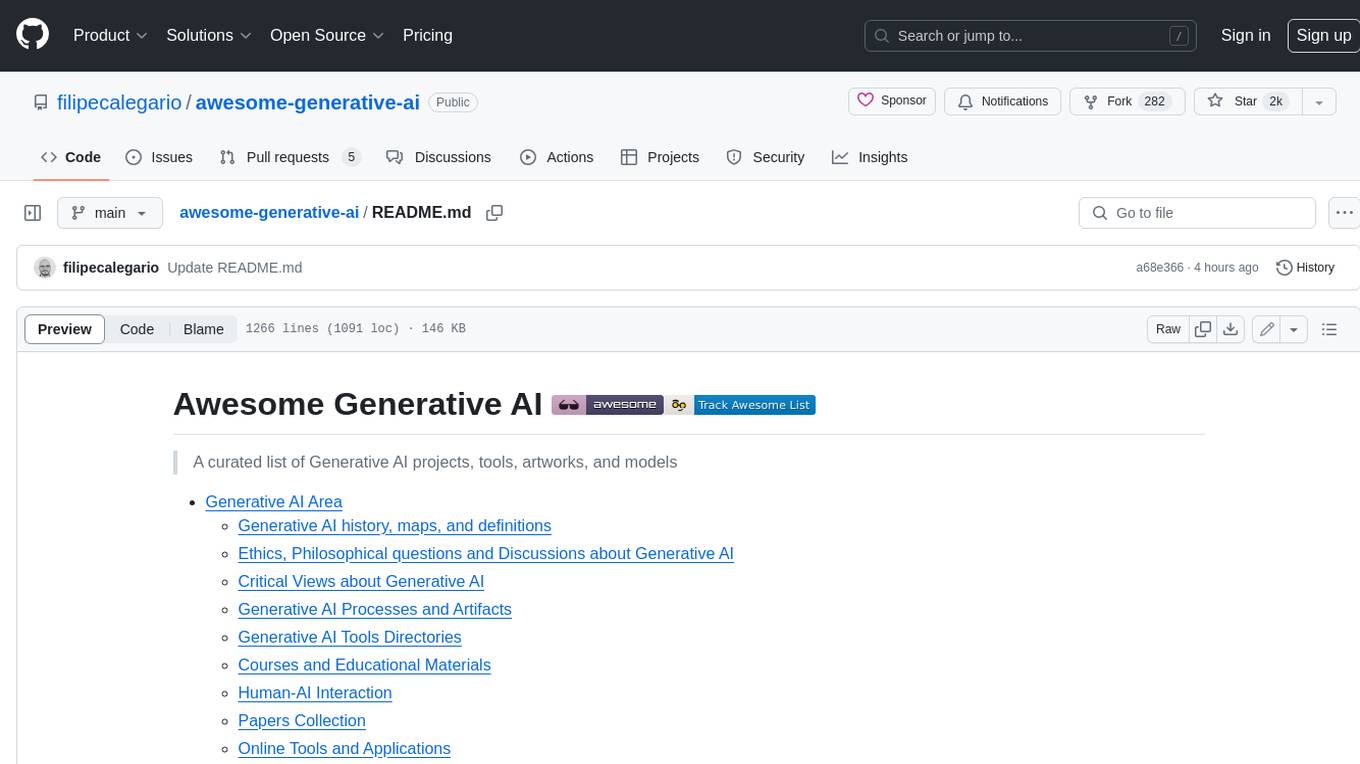
awesome-generative-ai
A curated list of Generative AI projects, tools, artworks, and models
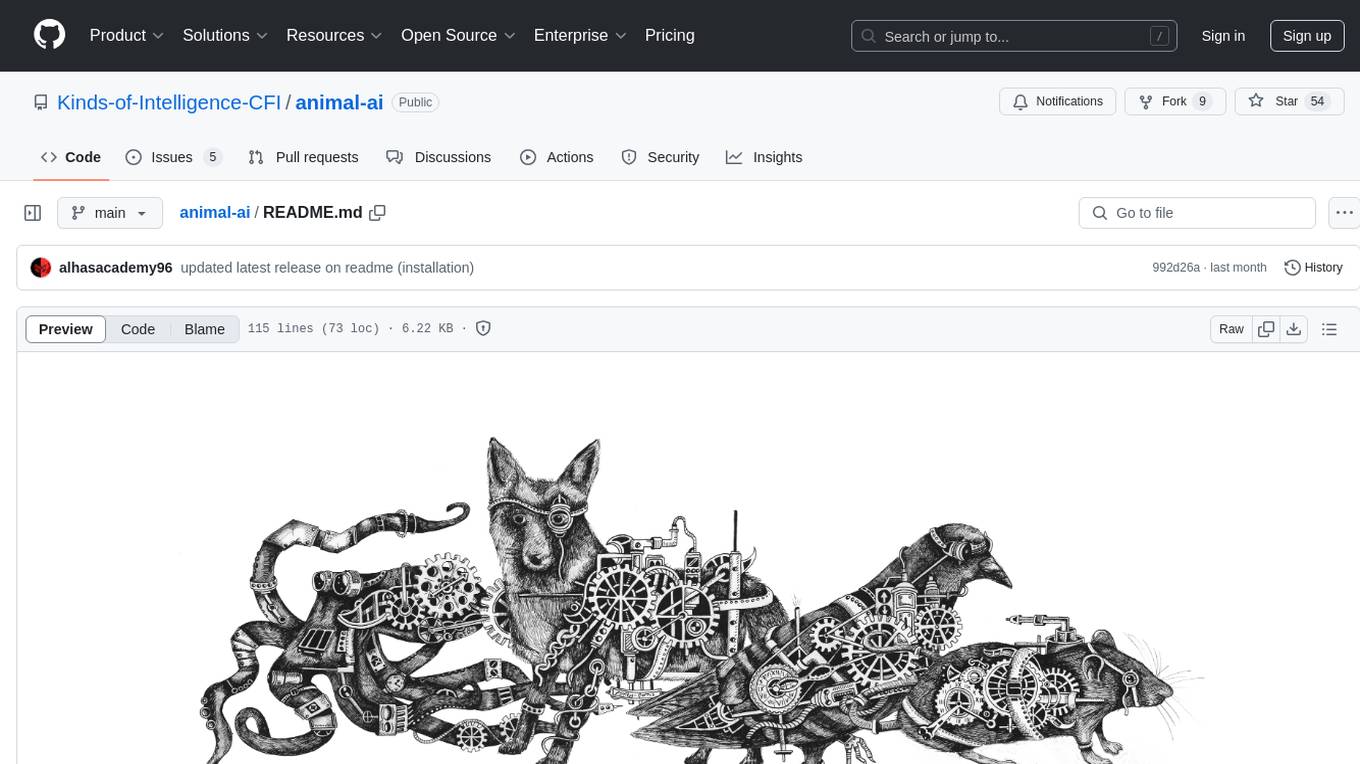
animal-ai
Animal-Artificial Intelligence (Animal-AI) is an interdisciplinary research platform designed to understand human, animal, and artificial cognition. It supports AI research to unlock cognitive capabilities and explore the space of possible minds. The open-source project facilitates testing across animals, humans, and AI, providing a comprehensive AI environment with a library of 900 tasks. It offers compatibility with Windows, Linux, and macOS, supporting Python 3.6.x and above. The environment utilizes Unity3D Game Engine, Unity ML-Agents toolkit, and provides interactive elements for AI training scenarios.
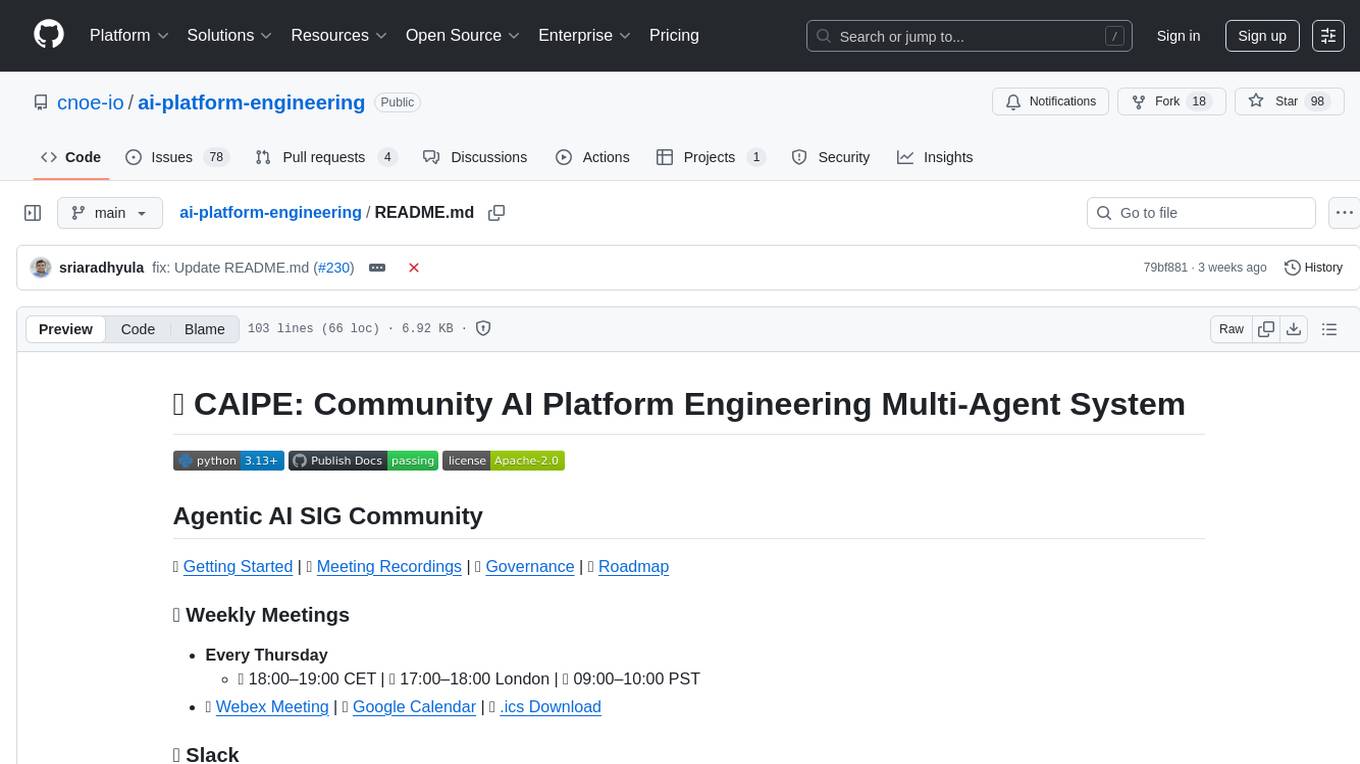
ai-platform-engineering
The AI Platform Engineering repository provides a collection of tools and resources for building and deploying AI models. It includes libraries for data preprocessing, model training, and model serving. The repository also contains example code and tutorials to help users get started with AI development. Whether you are a beginner or an experienced AI engineer, this repository offers valuable insights and best practices to streamline your AI projects.
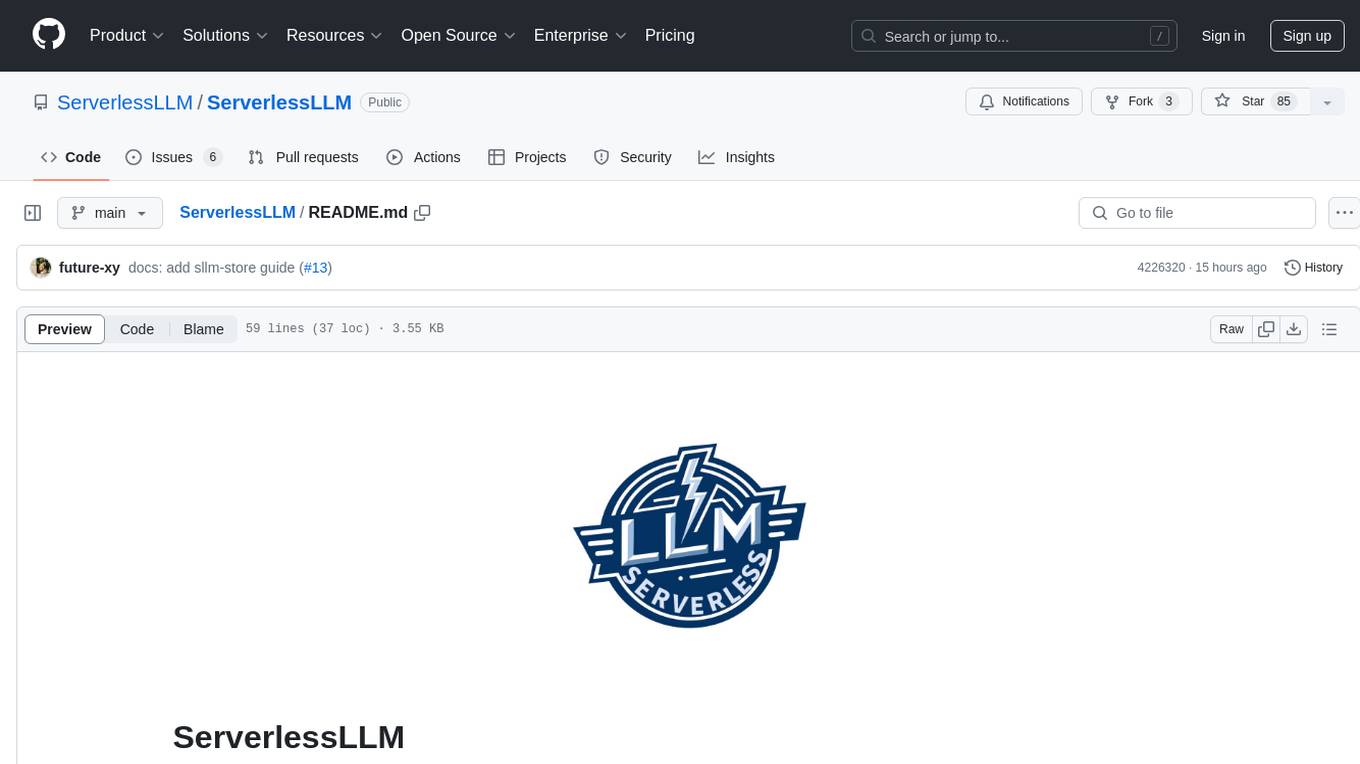
ServerlessLLM
ServerlessLLM is a fast, affordable, and easy-to-use library designed for multi-LLM serving, optimized for environments with limited GPU resources. It supports loading various leading LLM inference libraries, achieving fast load times, and reducing model switching overhead. The library facilitates easy deployment via Ray Cluster and Kubernetes, integrates with the OpenAI Query API, and is actively maintained by contributors.
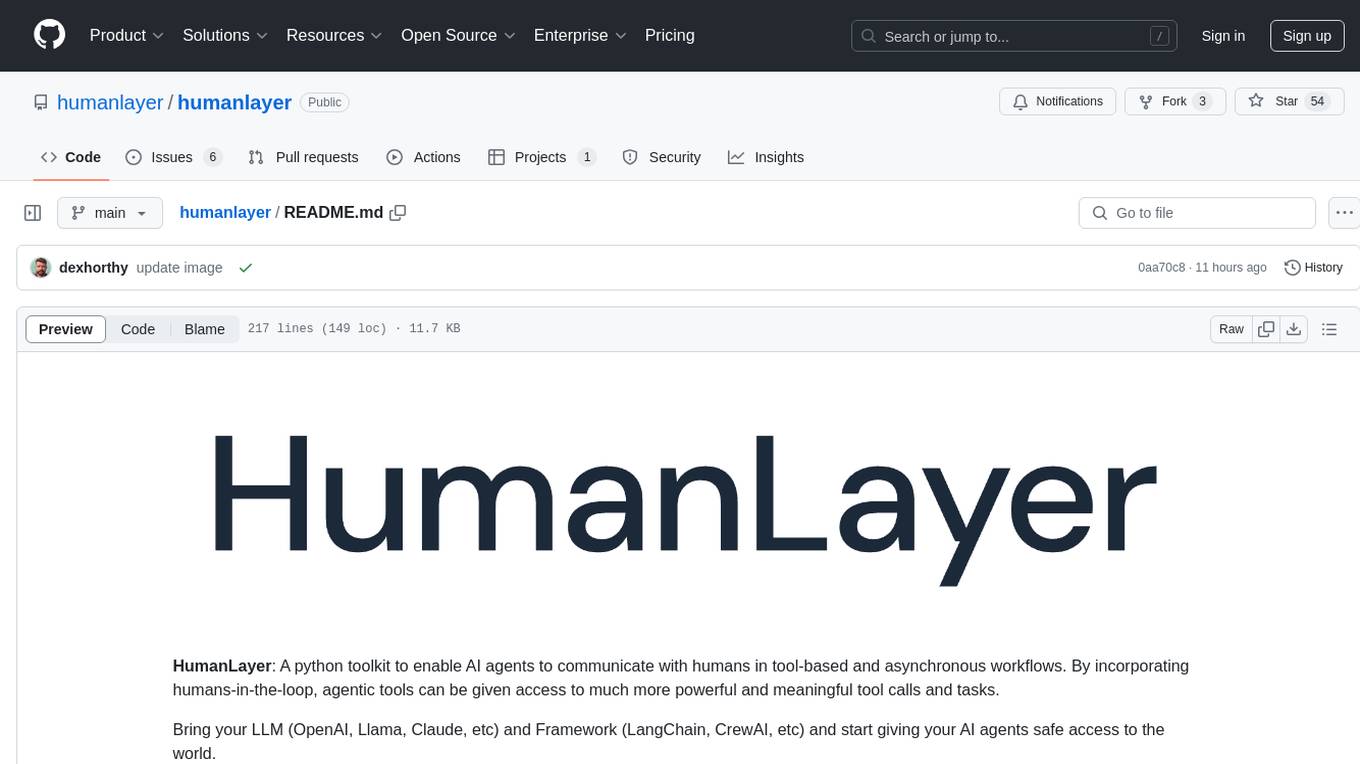
humanlayer
HumanLayer is a Python toolkit designed to enable AI agents to interact with humans in tool-based and asynchronous workflows. By incorporating humans-in-the-loop, agentic tools can access more powerful and meaningful tasks. The toolkit provides features like requiring human approval for function calls, human as a tool for contacting humans, omni-channel contact capabilities, granular routing, and support for various LLMs and orchestration frameworks. HumanLayer aims to ensure human oversight of high-stakes function calls, making AI agents more reliable and safe in executing impactful tasks.
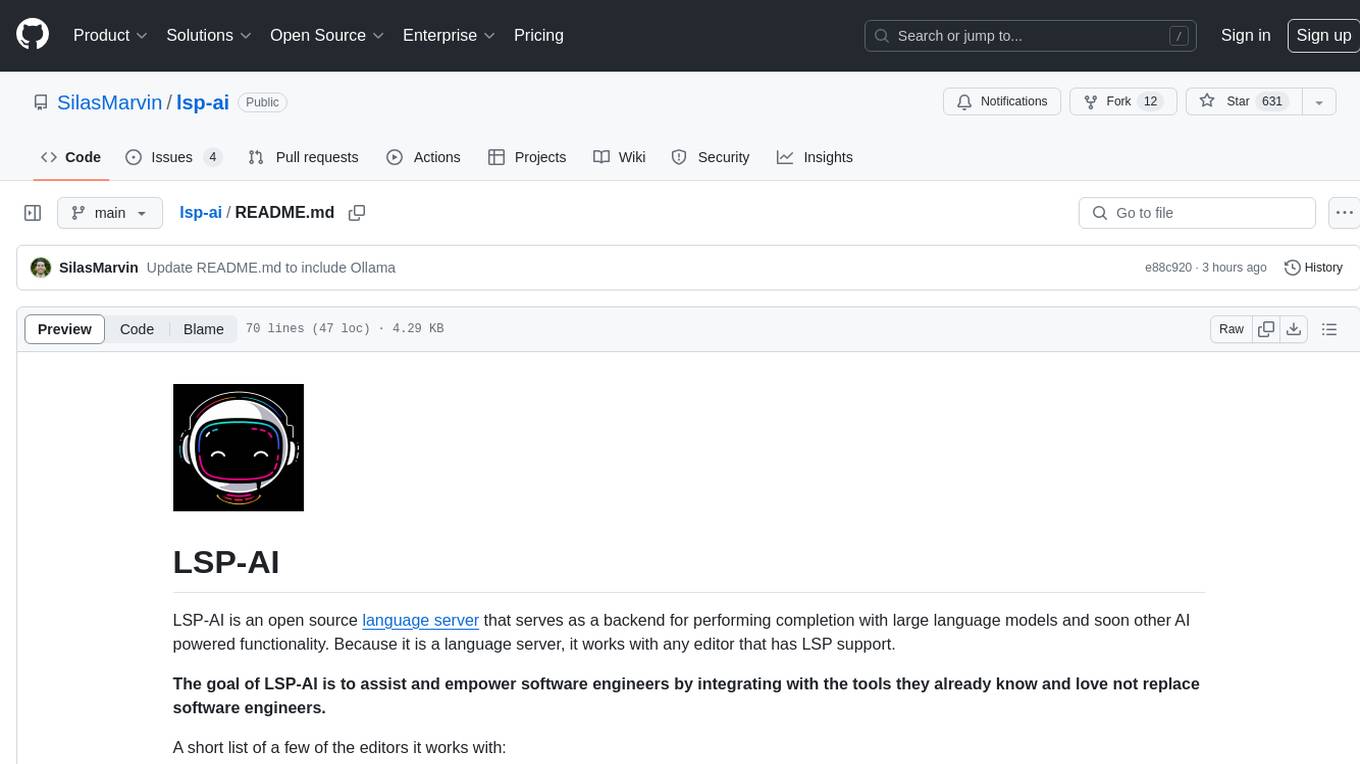
lsp-ai
LSP-AI is an open source language server designed to enhance software engineers' productivity by integrating AI-powered functionality into various text editors. It serves as a backend for completion with large language models and offers features like unified AI capabilities, simplified plugin development, enhanced collaboration, broad compatibility with editors supporting Language Server Protocol, flexible LLM backend support, and commitment to staying updated with the latest advancements in LLM-driven software development. The tool aims to centralize open-source development work, provide a collaborative platform for developers, and offer a future-ready solution for AI-powered assistants in text editors.
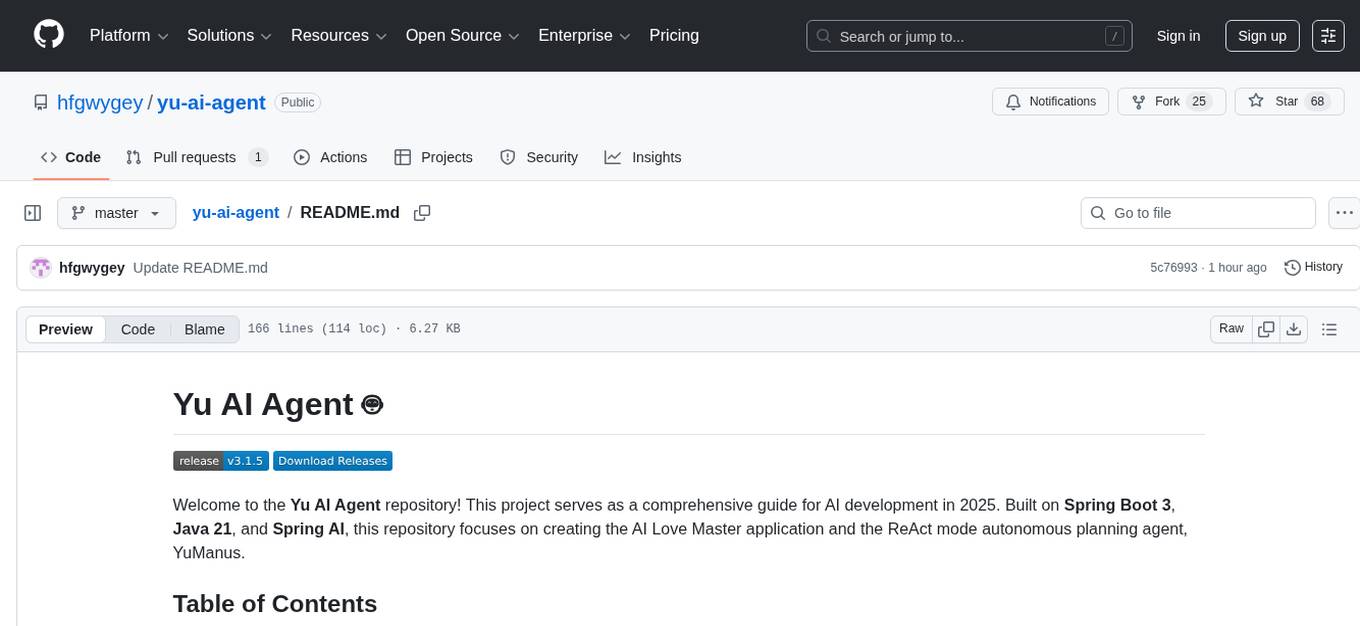
yu-ai-agent
The Yu AI Agent repository is a comprehensive guide for AI development in 2025, focusing on creating the AI Love Master application and the ReAct mode autonomous planning agent, YuManus. It equips programmers with essential AI skills through tutorials on AI model integration, Spring AI core features, prompt engineering, RAG, vector databases, tool calling, MCP, AI agent development, and Cursor AI tools. The project enhances resume and job prospects in the AI-driven job market.
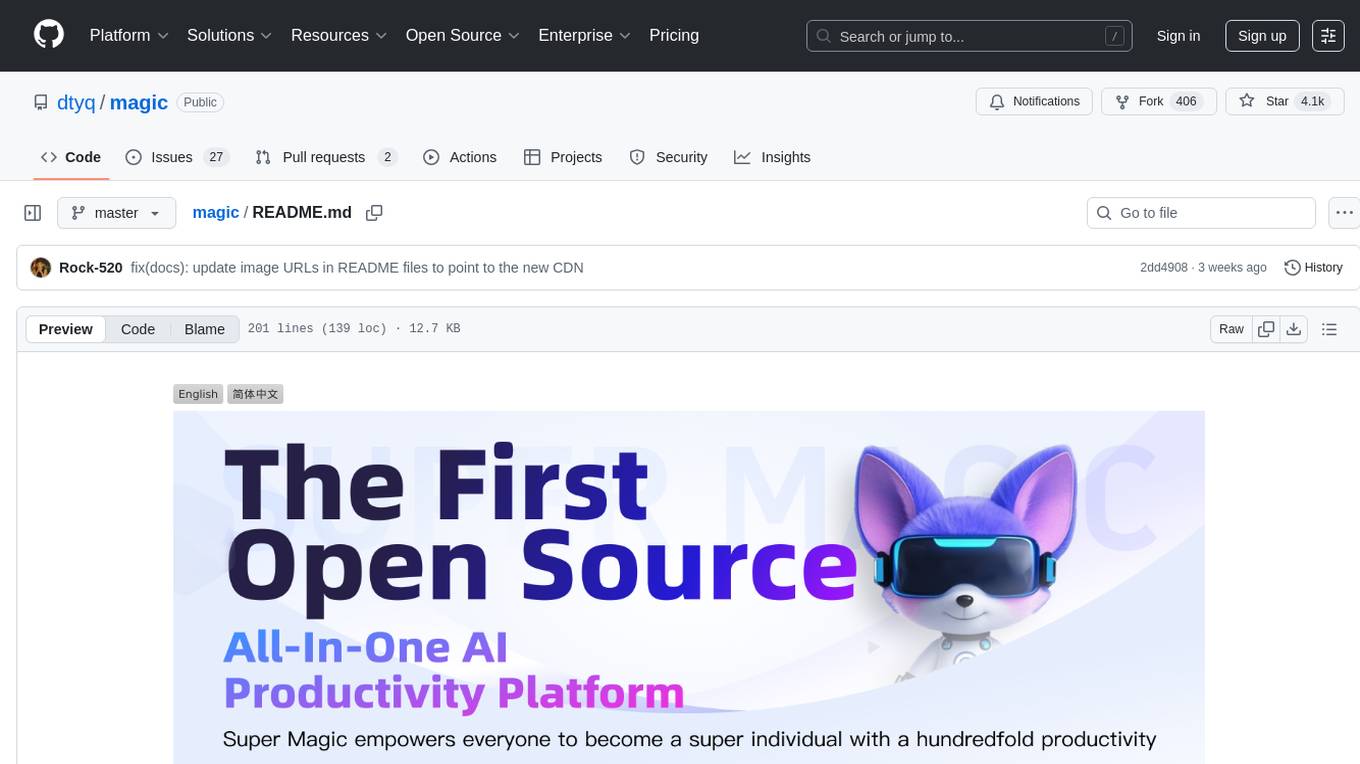
magic
Magic is an open-source all-in-one AI productivity platform designed to help enterprises quickly build and deploy AI applications, aiming for a 100x increase in productivity. It consists of various AI products and infrastructure tools, such as Super Magic, Magic IM, Magic Flow, and more. Super Magic is a general-purpose AI Agent for complex task scenarios, while Magic Flow is a visual AI workflow orchestration system. Magic IM is an enterprise-grade AI Agent conversation system for internal knowledge management. Teamshare OS is a collaborative office platform integrating AI capabilities. The platform provides cloud services, enterprise solutions, and a self-hosted community edition for users to leverage its features.

AgentForge
AgentForge is a low-code framework tailored for the rapid development, testing, and iteration of AI-powered autonomous agents and Cognitive Architectures. It is compatible with a range of LLM models and offers flexibility to run different models for different agents based on specific needs. The framework is designed for seamless extensibility and database-flexibility, making it an ideal playground for various AI projects. AgentForge is a beta-testing ground and future-proof hub for crafting intelligent, model-agnostic autonomous agents.

awesome-ai-tools
This repository contains a curated list of awesome AI tools that can be used for various machine learning and artificial intelligence projects. It includes tools for data preprocessing, model training, evaluation, and deployment. The list is regularly updated with new tools and resources to help developers and data scientists in their AI projects.
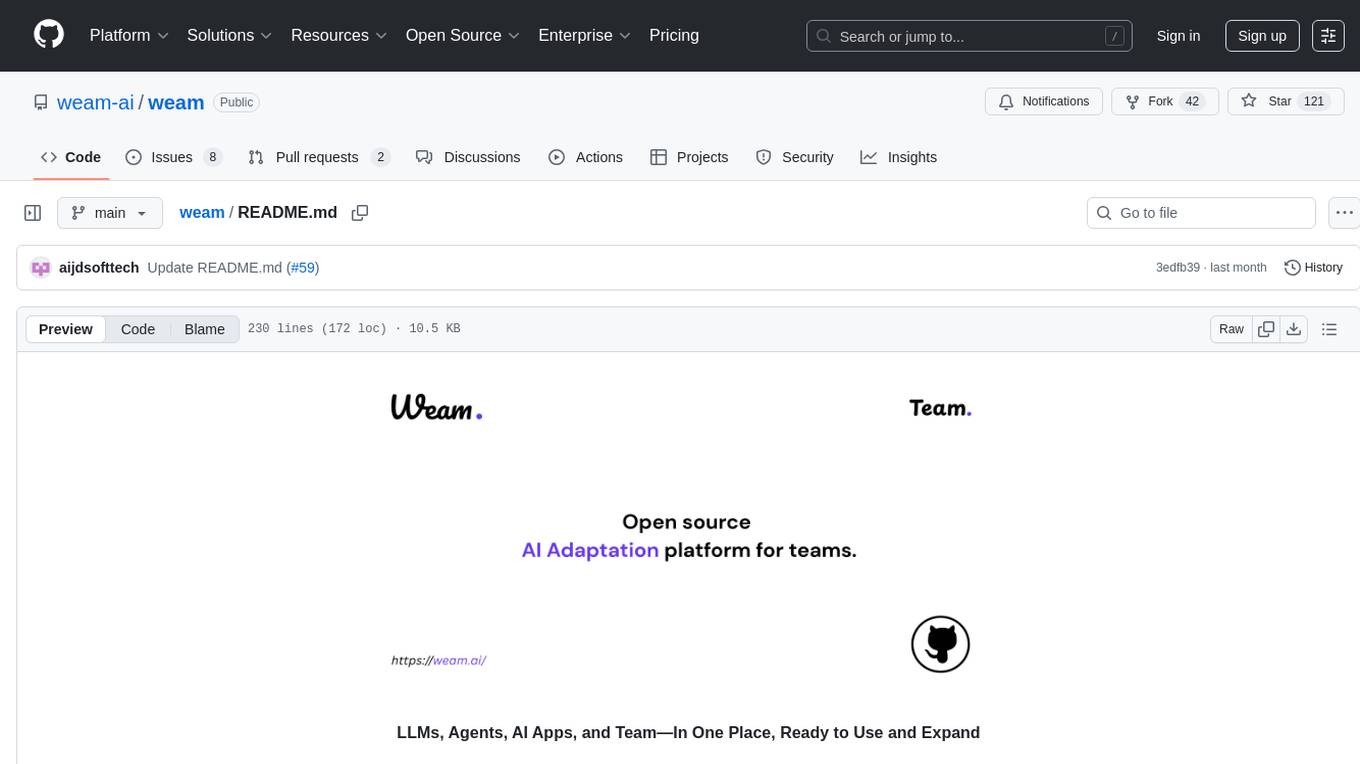
weam
Weam is an open source platform designed to help teams systematically adopt AI. It provides a production-ready stack with Next.js frontend and Node.js/Python backend, allowing for immediate deployment and use. Weam connects to major LLM providers, enabling easy access to the latest AI models. The platform organizes AI interactions into 'Brains' for different departments, offering customization and expansion options. Features include chat system, productivity tools, sharing & access controls, prompt library, AI agents, RAG, MCP, enterprise features, pre-built automations, and upcoming AI app solutions. Weam is free, open source, and scalable to meet growing needs.
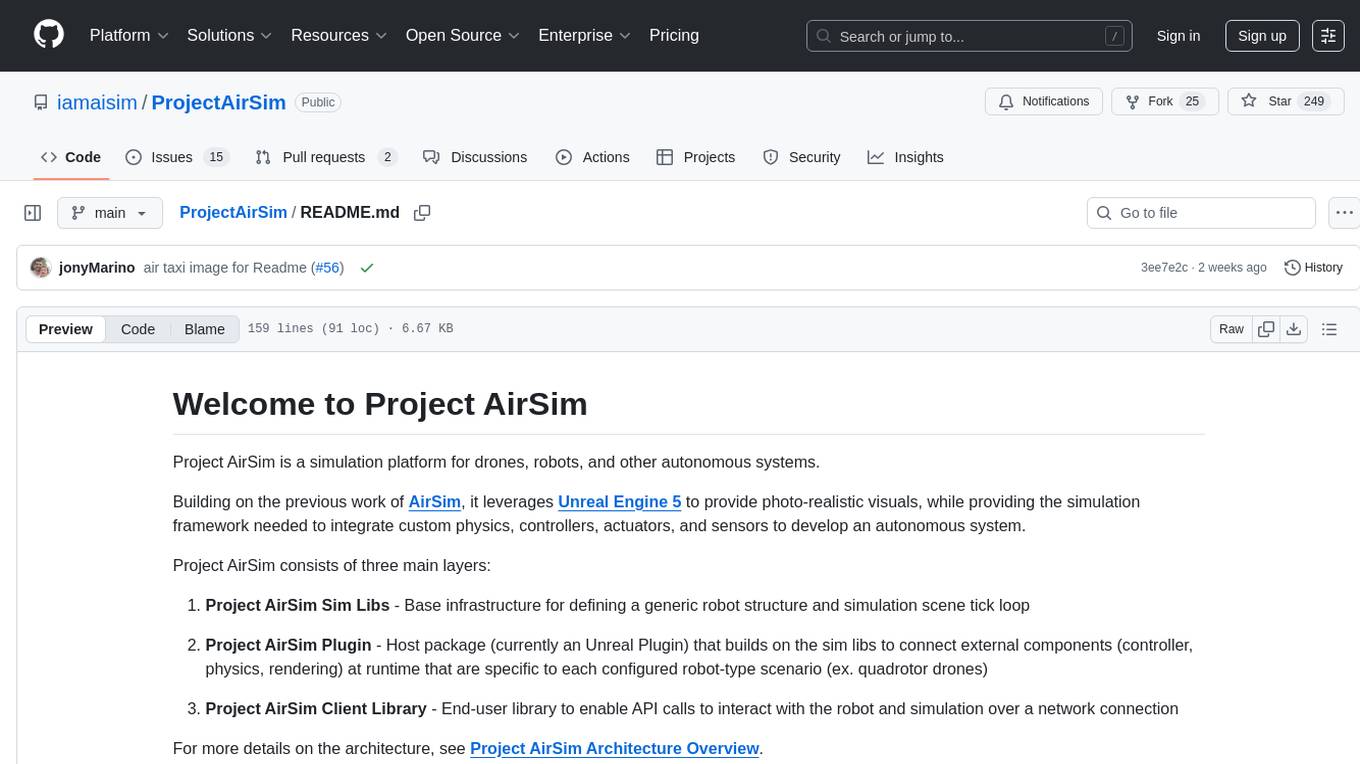
ProjectAirSim
Project AirSim is a simulation platform for drones, robots, and autonomous systems. Leveraging Unreal Engine 5, it provides photo-realistic visuals and a simulation framework for custom physics, controllers, actuators, and sensors. It consists of three main layers: Sim Libs, Plugin, and Client Library. It supports Windows 11 and Ubuntu 22, inviting collaboration and enterprise support. Users can join the community, contribute to the roadmap, and get started with pre-built binaries or building from source. It offers headless running options and references for configuration settings, API, controllers, sensors, scene, physics, and FAQ.
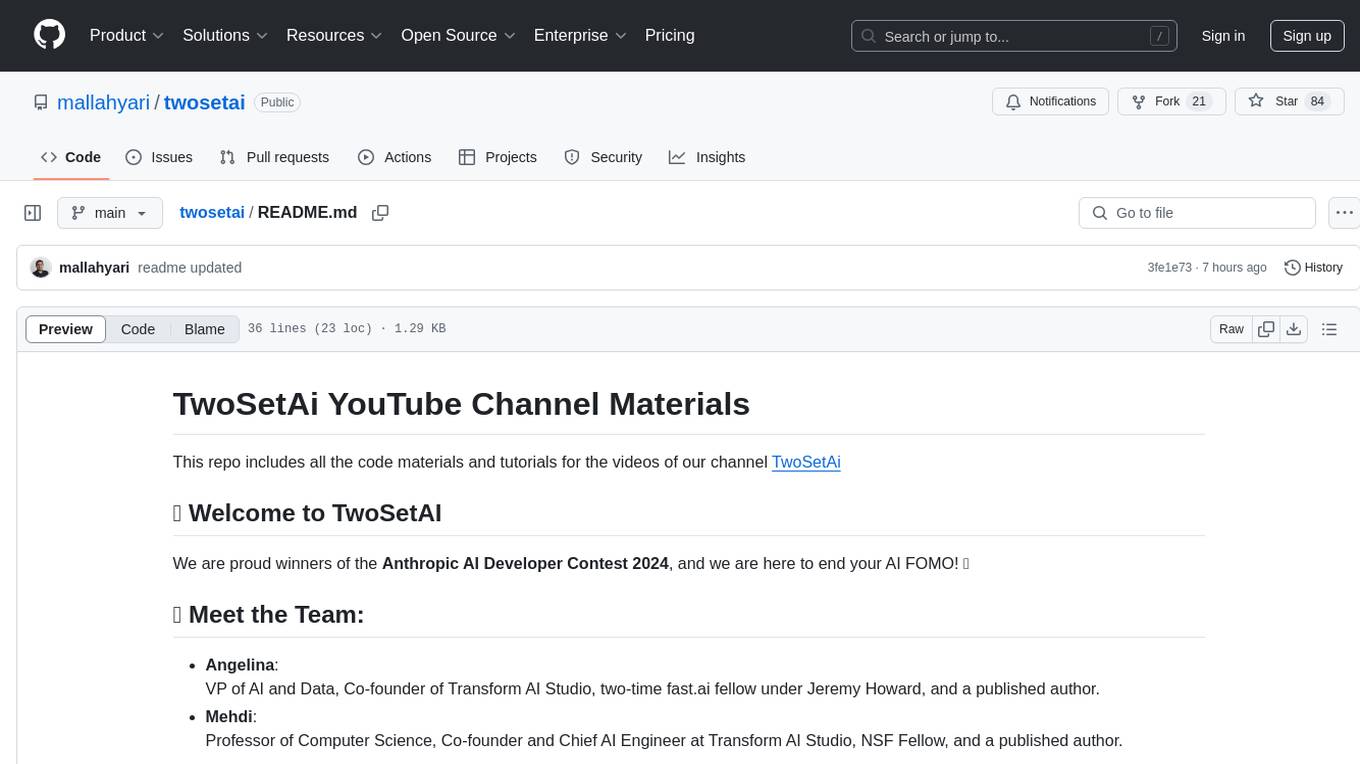
twosetai
TwoSetAI YouTube Channel Materials is a repository containing code materials and tutorials for the videos of the TwoSetAI channel. The team behind TwoSetAI aims to make AI accessible to everyone by covering various AI-related topics, including AI products, latest trends, in-depth engineering insights, career advice for AI enthusiasts, and the entrepreneurial side of AI. The team consists of Angelina, VP of AI and Data, and Mehdi, Professor of Computer Science, who are both published authors and have significant experience in the AI field. TwoSetAI has won the Anthropic AI Developer Contest 2024 and is dedicated to ending AI FOMO for its audience.
For similar tasks

Midori-AI
Midori AI is a cutting-edge initiative dedicated to advancing the field of artificial intelligence through research, development, and community engagement. They focus on creating innovative AI solutions, exploring novel approaches, and empowering users to harness the power of AI. Key areas of focus include cluster-based AI, AI setup assistance, AI development for Discord bots, model serving and hosting, novel AI memory architectures, and Carly - a fully simulated human with advanced AI capabilities. They have also developed the Midori AI Subsystem to streamline AI workloads by providing simplified deployment, standardized configurations, isolation for AI systems, and a growing library of backends and tools.
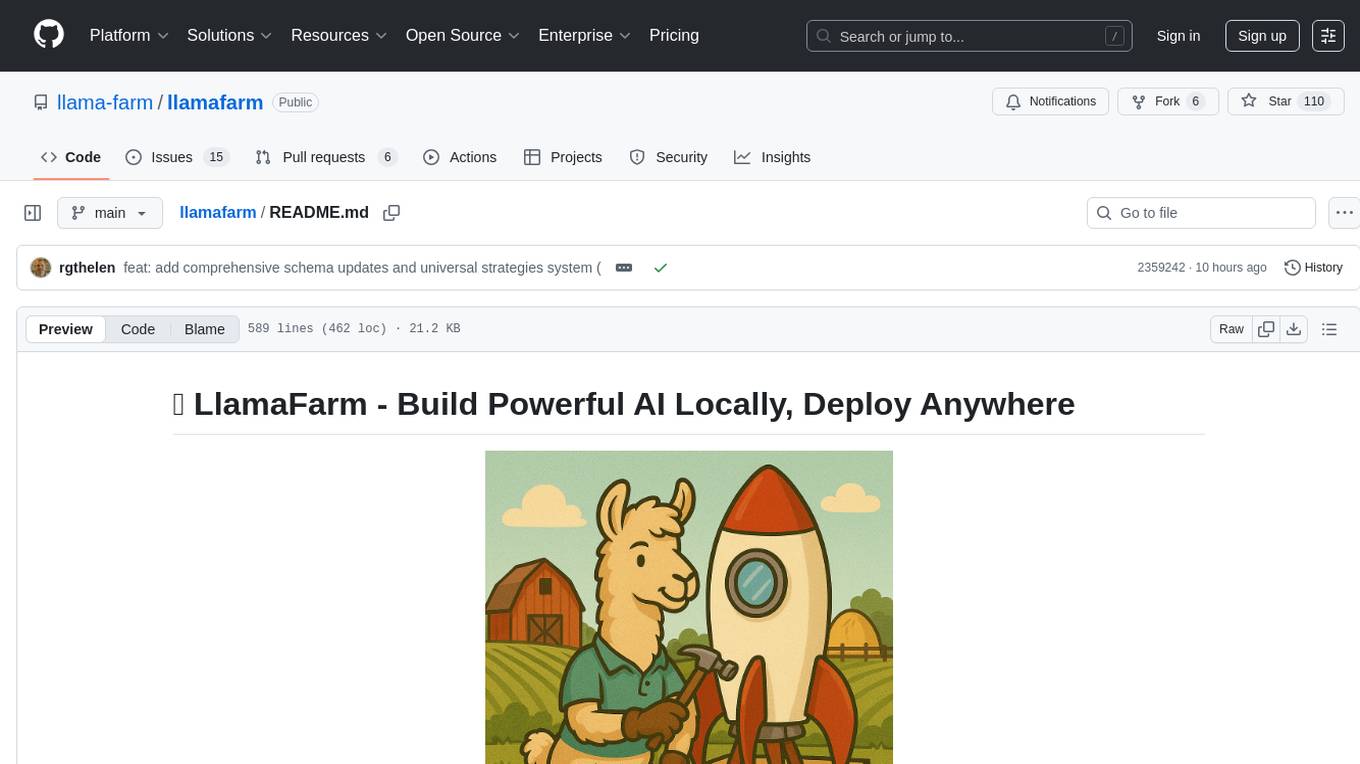
llamafarm
LlamaFarm is a comprehensive AI framework that empowers users to build powerful AI applications locally, with full control over costs and deployment options. It provides modular components for RAG systems, vector databases, model management, prompt engineering, and fine-tuning. Users can create differentiated AI products without needing extensive ML expertise, using simple CLI commands and YAML configs. The framework supports local-first development, production-ready components, strategy-based configuration, and deployment anywhere from laptops to the cloud.
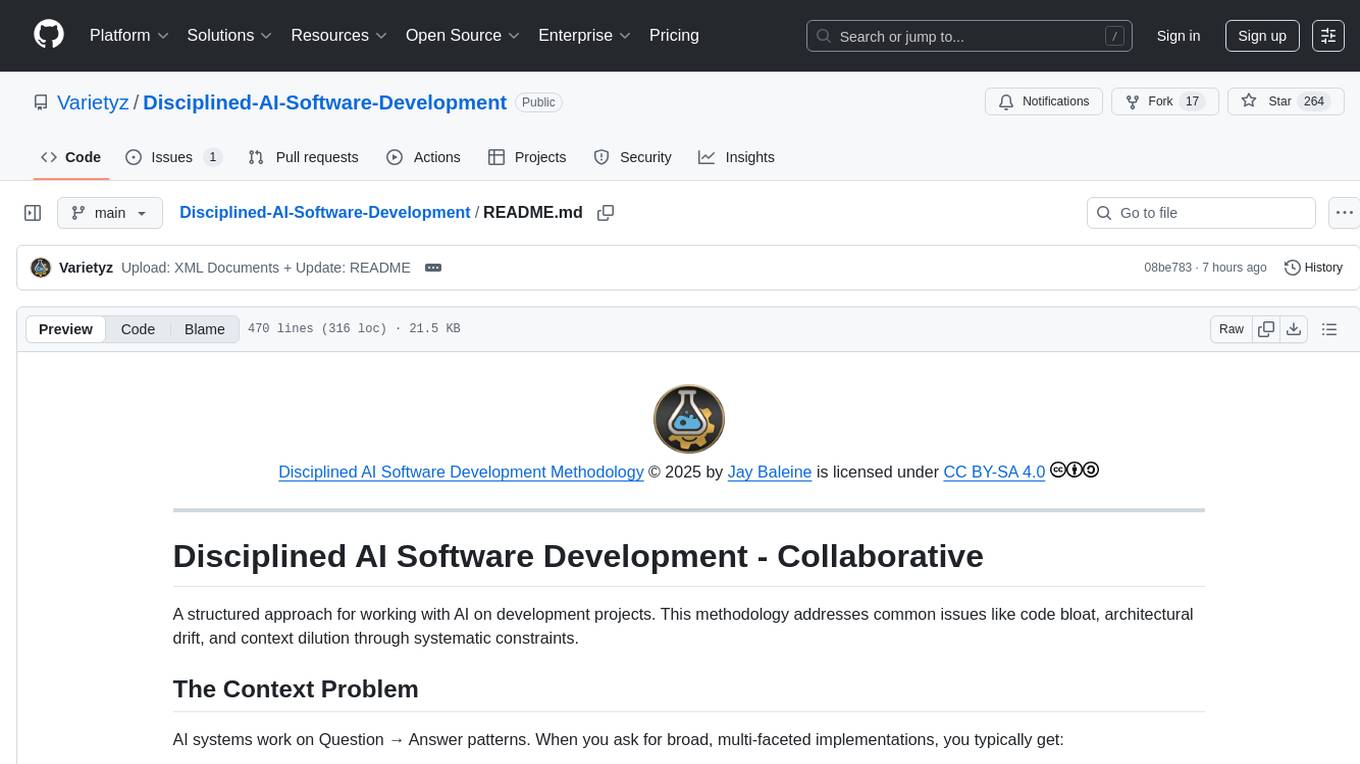
Disciplined-AI-Software-Development
Disciplined AI Software Development is a comprehensive repository that provides guidelines and best practices for developing AI software in a disciplined manner. It covers topics such as project organization, code structure, documentation, testing, and deployment strategies to ensure the reliability, scalability, and maintainability of AI applications. The repository aims to help developers and teams navigate the complexities of AI development by offering practical advice and examples to follow.
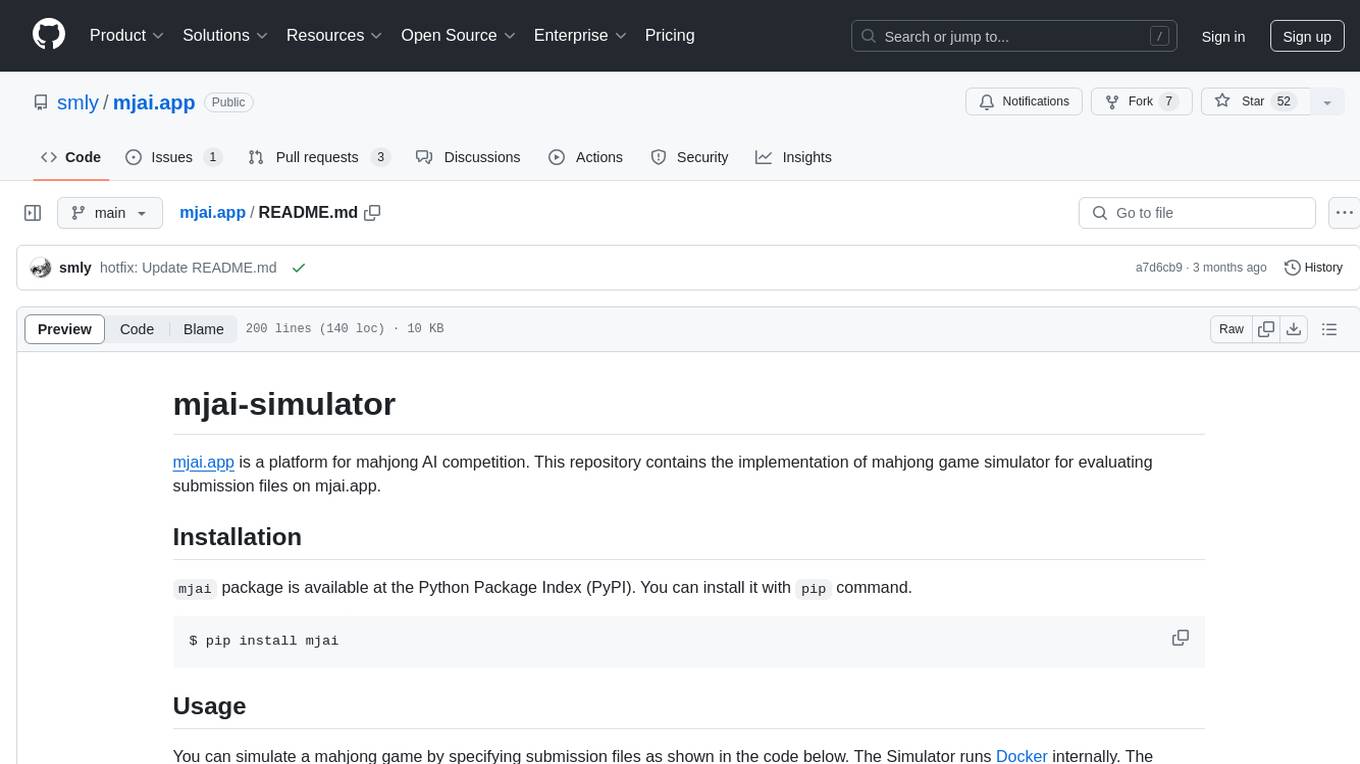
mjai.app
mjai.app is a platform for mahjong AI competition. It contains an implementation of a mahjong game simulator for evaluating submission files. The simulator runs Docker internally, and there is a base class for developing bots that communicate via the mjai protocol. Submission files are deployed in a Docker container, and the Docker image is pushed to Docker Hub. The Mjai protocol used is customized based on Mortal's Mjai Engine implementation.

ai-on-gke
This repository contains assets related to AI/ML workloads on Google Kubernetes Engine (GKE). Run optimized AI/ML workloads with Google Kubernetes Engine (GKE) platform orchestration capabilities. A robust AI/ML platform considers the following layers: Infrastructure orchestration that support GPUs and TPUs for training and serving workloads at scale Flexible integration with distributed computing and data processing frameworks Support for multiple teams on the same infrastructure to maximize utilization of resources

ray
Ray is a unified framework for scaling AI and Python applications. It consists of a core distributed runtime and a set of AI libraries for simplifying ML compute, including Data, Train, Tune, RLlib, and Serve. Ray runs on any machine, cluster, cloud provider, and Kubernetes, and features a growing ecosystem of community integrations. With Ray, you can seamlessly scale the same code from a laptop to a cluster, making it easy to meet the compute-intensive demands of modern ML workloads.

labelbox-python
Labelbox is a data-centric AI platform for enterprises to develop, optimize, and use AI to solve problems and power new products and services. Enterprises use Labelbox to curate data, generate high-quality human feedback data for computer vision and LLMs, evaluate model performance, and automate tasks by combining AI and human-centric workflows. The academic & research community uses Labelbox for cutting-edge AI research.

djl
Deep Java Library (DJL) is an open-source, high-level, engine-agnostic Java framework for deep learning. It is designed to be easy to get started with and simple to use for Java developers. DJL provides a native Java development experience and allows users to integrate machine learning and deep learning models with their Java applications. The framework is deep learning engine agnostic, enabling users to switch engines at any point for optimal performance. DJL's ergonomic API interface guides users with best practices to accomplish deep learning tasks, such as running inference and training neural networks.
For similar jobs

weave
Weave is a toolkit for developing Generative AI applications, built by Weights & Biases. With Weave, you can log and debug language model inputs, outputs, and traces; build rigorous, apples-to-apples evaluations for language model use cases; and organize all the information generated across the LLM workflow, from experimentation to evaluations to production. Weave aims to bring rigor, best-practices, and composability to the inherently experimental process of developing Generative AI software, without introducing cognitive overhead.

LLMStack
LLMStack is a no-code platform for building generative AI agents, workflows, and chatbots. It allows users to connect their own data, internal tools, and GPT-powered models without any coding experience. LLMStack can be deployed to the cloud or on-premise and can be accessed via HTTP API or triggered from Slack or Discord.

VisionCraft
The VisionCraft API is a free API for using over 100 different AI models. From images to sound.

kaito
Kaito is an operator that automates the AI/ML inference model deployment in a Kubernetes cluster. It manages large model files using container images, avoids tuning deployment parameters to fit GPU hardware by providing preset configurations, auto-provisions GPU nodes based on model requirements, and hosts large model images in the public Microsoft Container Registry (MCR) if the license allows. Using Kaito, the workflow of onboarding large AI inference models in Kubernetes is largely simplified.

PyRIT
PyRIT is an open access automation framework designed to empower security professionals and ML engineers to red team foundation models and their applications. It automates AI Red Teaming tasks to allow operators to focus on more complicated and time-consuming tasks and can also identify security harms such as misuse (e.g., malware generation, jailbreaking), and privacy harms (e.g., identity theft). The goal is to allow researchers to have a baseline of how well their model and entire inference pipeline is doing against different harm categories and to be able to compare that baseline to future iterations of their model. This allows them to have empirical data on how well their model is doing today, and detect any degradation of performance based on future improvements.

tabby
Tabby is a self-hosted AI coding assistant, offering an open-source and on-premises alternative to GitHub Copilot. It boasts several key features: * Self-contained, with no need for a DBMS or cloud service. * OpenAPI interface, easy to integrate with existing infrastructure (e.g Cloud IDE). * Supports consumer-grade GPUs.

spear
SPEAR (Simulator for Photorealistic Embodied AI Research) is a powerful tool for training embodied agents. It features 300 unique virtual indoor environments with 2,566 unique rooms and 17,234 unique objects that can be manipulated individually. Each environment is designed by a professional artist and features detailed geometry, photorealistic materials, and a unique floor plan and object layout. SPEAR is implemented as Unreal Engine assets and provides an OpenAI Gym interface for interacting with the environments via Python.

Magick
Magick is a groundbreaking visual AIDE (Artificial Intelligence Development Environment) for no-code data pipelines and multimodal agents. Magick can connect to other services and comes with nodes and templates well-suited for intelligent agents, chatbots, complex reasoning systems and realistic characters.
